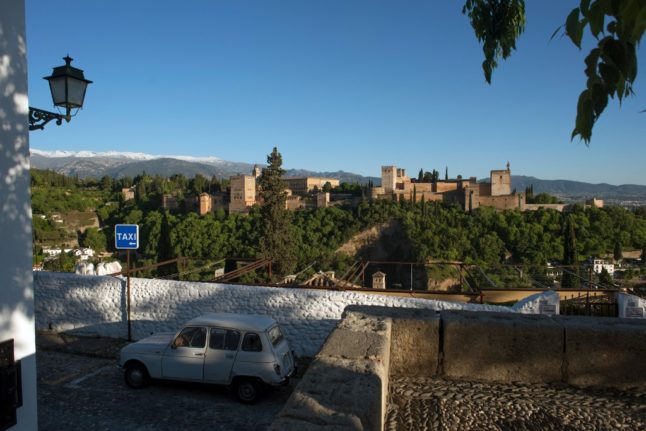It’s a situation in which hundreds if not thousands of UK driving licence holders in Spain find themselves as negotiations between the Spanish and British authorities drag on over the exchange of vehicle data.
The latest weekly update by the British Embassy in Madrid on May 27th spoke of the “good progress towards an agreement” being made, but for the people who have been unable to drive in Spain for the past month, patience is wearing thin.
“I fell off a ladder the other day, I am now on two crutches and have a cast on my leg,” explained David Dawson, 73, who lives in Llanos del Peral, Almería.
“We live in a rural community, and right now I’m unable to walk and my wife is unable to drive our car. This licence business needs sorting out.”
The situation has arisen as a result of Brexit. Before the UK left the EU, British vehicle data was shared with Member States.
But Spain is now requesting access to data for UK-registered vehicles who commit traffic offences while on Spanish roads via an automated system, as part of a formal agreement for licence exchange for UK residents in Spain.
One of the sticking points in the negotiations has been that the British authorities want to keep the two issues separate.
A deadline for when UK licences would no longer be valid for residents who have been in Spain for more than six months was extended five times as talks continued but eventually expired on April 30th.
Those left with an invalid licence can now either take a new driving test in Spain or wait for an agreement between the two sides.
David Dawson’s story is similar to those of many who are in this situation, whereby through no fault of his own, he was unable to swap the document.
He told The Local that he and his wife arrived in Spain in December 2020 and tried to apply to exchange their licences. But their lawyer did not do as instructed and they missed the deadline as a result.
“Our nearest shop is around six kilometres away, the nearest large town is 20 kilometres away,” he said. “You can only imagine the difficulties we now face, with, worryingly, no solution in place. The whole issue is an avoidable nightmare.”
“Ariadne,” 62, who preferred not to supply her real name, suffered a similar experience.
“Our gestoría misinformed us regarding access to our NIE,” she explained, in reference to the Spanish tax identification number. “We were told that we didn’t have it in time to change our licence.
But it seems we already had access to the numbers and could have swapped it. Through no fault of our own, but rather Spanish bureaucracy, we are now stuck two years later as residents who are unable to drive.”
READ ALSO: What now UK licence holders in Spain?
Both Ariadne and her husband are disabled, and she said they would be unable to take a test in Spanish.
“It’s a desperate situation impacting on our quality of life,” she complained.
“We moved to Mallorca for an easier life, now it’s too hard.”
Maggie Parkinson, 51, who lives in Alicante, managed to apply for the licence exchange in September 2020, but was later told that the paperwork had been lost.
“I started working as a home carer earlier this year and I now have to give this up as I am not allowed to drive,” she told The Local.
“It’s not only affecting me but also my clients. We moved to Spain to explore the beautiful country and now we can’t. We need to continue with the extension whilst negotiations are still in place,” she argued.
The problem is not just affecting UK nationals, however. While Irish passport holders living in Spain have been spared the issues that Brexit brought with it, if they happen to hold a UK licence they find themselves in the same boat. Even Spaniards are suffering.
Sergio Cano, 34, is originally from Mallorca and obtained his driving licence while he was living in London.
In 2016 he moved back to Spain and only became aware of the changes in 2020. He missed the deadline to swap his British document for a Spanish one, and is now living in Madrid but unable to take to the roads.
“I don’t know what to do,” he said. “If they had told me we are not going to get an agreement, I would already have started the other way to try and get a driving test.”
He added that he doesn’t want to waste the time or pay the hundreds of euros that doing the test will cost to get a licence he already holds.
READ ALSO: How much does it cost to get your driving licence in Spain?
A spokesperson from Spain’s DGT traffic authority expressed bewilderment to The Local as to why the UK authorities have not been willing to put in a similar information-exchange system to the one that existed before, but added that a solution should be on the horizon in a matter of weeks.
This was echoed by a spokesperson from the British embassy, who told The Local: “We are in intensive talks with the Spanish government to reach an agreement to swap UK driving licences for Spanish ones.
We are hopeful that an agreement will be reached in the coming weeks and remain fully committed to making this happen.”
In the meantime, UK licence holders in Spain will have to find alternative, and often costly, ways to get around.
If you want to sign the official petition calling for the mutual recognition of UK and Spanish driving licences, click here. At 10,000 signatures, the UK government will respond to this petition.
READ MORE:




 Please whitelist us to continue reading.
Please whitelist us to continue reading.
Member comments